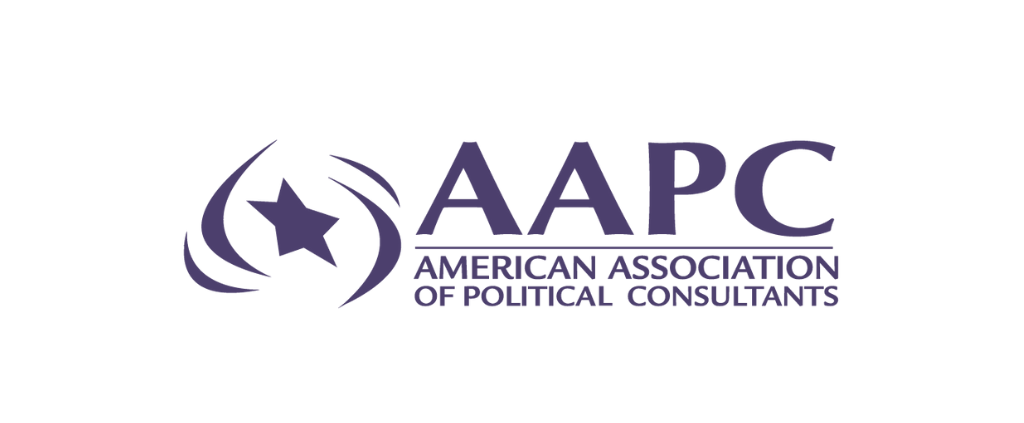AAPC Condemns Use of Deceptive Generative AI Content in Political Campaigns
Contact:
Alana Joyce
Executive Director
703-245-8021
[email protected]
FOR IMMEDIATE RELEASE
May 3, 2023
AAPC CONDEMNS USE OF DECEPTIVE GENERATIVE AI CONTENT IN POLITICAL CAMPAIGNS
AAPC Board of Directors Unanimously Votes to Adopt New Policy for its Members
MCLEAN, VA – At its recent Pollie Awards & Conference last month, the bipartisan Board of Directors of the American Association of Political Consultants (AAPC) unanimously agreed to condemn the use of generative AI “deep fake” content in political campaigns and today issued a policy statement to guide how the Association applies this purposefully deceptive technology within its current Professional Code of Ethics, which governs members’ actions and enforces any violations of the code.
“The Board unanimously agreed that the use of ’deep fake’ generative Artificial Intelligence (AI) content is a dramatically different and dangerous threat to democracy,” said AAPC President R. Rebecca Donatelli. “AAPC is proud of and committed to upholding our Code of Ethics and believed we needed to address this burgeoning technology and make it clear to our members that its use is a blatant violation of our existing Code of Ethics.”
The policy statement highlights that the current AAPC Professional Code of Ethics clearly condemns false and misleading statements: “…Deep fake” generative AI is contrary to the Code of Ethics because, at its core, “deep fake” content is a deception and has no place in legitimate, ethical campaigns. Therefore, AAPC’s Code of Ethics prohibits the use of “deep fake” generative AI content.
AAPC Vice President Larry Huynh added, “AAPC will continue to protect members and voters who rely on straightforward political communications to make informed decisions while ensuring free speech, including the use of satire or parody, thrives within the $9 billion political advertising industry that our members represent.”
Donatelli also noted that the policy establishes a new industry standard for its members by prohibiting any advertising using “deep fake” generative AI content from being eligible for AAPC Awards. Additionally, the AAPC is also encouraging all media, advertising platforms, and delivery systems to refuse to carry or deliver ads using “deep fake” generative AI content.
The Full AAPC Policy Statement on Generative AI Can Be Read Here:
“The rise of so-called ’deep fake’ content generated by AI in political campaigns presents a troubling challenge to the free and fair debate of political ideas. With the use of generative AI, so-called “deep fake” technology can make distinguishing between reality and deception difficult. Citizens must have confidence in the basic truthfulness of political campaigns. While the public’s trust in institutions and campaigns has been shaken in recent decades, the use of “deep fake” generative AI content is a dramatically different and dangerous threat to democracy.
The AAPC Professional Code of Ethics currently clearly condemns false and misleading statements. “Deep fake” generative AI is contrary to the Code of Ethics because, at its core, “deep fake” content is a deception and has no place in legitimate, ethical campaigns. Therefore, AAPC’s Code of Ethics prohibits the use of “deep fake” generative AI content.
Further, no advertising using “deep fake” generative AI content will be eligible for AAPC Awards. The AAPC also encourages all media, advertising platforms, and delivery systems to refuse to carry or deliver ads using “deep fake” generative AI content.
The AAPC will use a broad standard to review, condemn, and, if necessary, sanction its members for using “deep fake” ads produced with generative AI technology. This broad prohibition includes deploying “deep fake” generative AI for non-advertising purposes in a political contest. AAPC members are advised that issuing a warning or disclaimer that the audience is viewing a “deep fake” video created using generative AI is insufficient and will not be accepted as a method to avoid this standard.
We will continue to closely monitor these technological evolutions in ad-making while protecting satire and the free discussion of ideas. At this point, “deep fake” imagery used in political ads can be defined as synthetic, computer-generated video, stills, or audio elements derived from a person’s likeness, voice, or image that is so near realistic that it is intended to lead voters to deceptive conclusions alternative to reality about a candidate, party, or issue.
The AAPC does not believe “deep fake” generative AI content as defined above qualifies as satire. AAPC believes there is a strong distinction between parody and an intent to deceive. Satire and even comedic impersonation have a long tradition in democracies and have always been presented with the audience being fully aware and “in on the joke.” The AAPC will continue to stand by its members who exercise their right to free speech with humor and satire when they use truthful and accurate images and quotes.”
###
About AAPC
Founded in 1969, the AAPC is a multi-partisan organization of political and public affairs professionals dedicated to improving democracy. The AAPC has more than 1,600 members hailing from all corners of the globe. The Board of Directors is comprised of 32 members, evenly divided between Republicans and Democrats. It is the largest association of political and public affairs professionals in the world. For more information, see www.theaapc.org.

